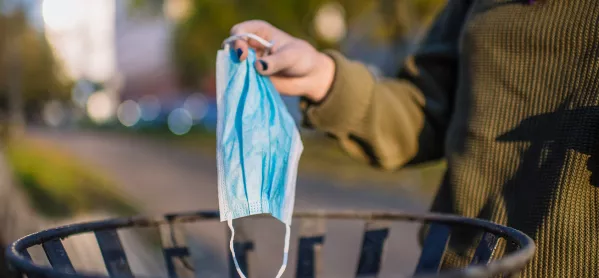Covid absence down but heads fear new wave could hit schools

Heads have warned that the government’s Living with Covid plan risks schools being disrupted by another wave of the virus just as new figures suggest the sector has got past the worst of the Omicron peak.
Government data published today shows that absence rates for pupils have fallen in recent weeks, with 181,600 pupils off for Covid-related reasons in total on Thursday 10 February (2.2 per cent), down from 3.9 per cent of pupils a week earlier.
The proportion of staff absent for Covid-related reasons also fell, with 7.5 per cent of teachers and school leaders off compared with 9.1 per cent on 3 February, data released today shows.
- New: Covid testing for school staff and students to end today
- Infection: Teachers more likely to catch Covid than other workers
- Covid: 315,000 pupils off in the first week of term
The number of pupils off with a confirmed case of the virus have fallen to below what it was on 6 January, when 159,000 pupils were absent with a confirmed case.
The latest figures show there were 136,000 pupils who tested positive for the coronavirus - that’s 1.7 per cent of pupils on roll in open schools, down from 3.1 per cent on 3 February when there were 250,000 confirmed cases.
Case numbers among pupils peaked on 20 January at 322,000.
However, heads have warned that the relaxation of Covid restrictions announced by the prime minister last night could reverse the trend.
In the Living with Covid guidance published yesterday, the government said it was removing guidance “for staff and students in most education and childcare settings to undertake twice-weekly asymptomatic testing”.
Lifting of restrictions risks ‘new wave’
Geoff Barton, general secretary of the Association of School and College Leaders, said that he was “pleased” to see rates of pupil and staff absence caused by Covid decreasing.
However, he warned that the government’s Living with Covid plan, and the lifting of virtually all control measures, “does run the risk of causing a new wave of transmission and disruption in our schools and colleges”.
He added: ”We hope that is not the case, but vigilance is important.
“Schools and colleges have weathered a very tough half term with extremely high rates of pupil and staff absence caused by the virus, and they deserve enormous credit for all they have done to keep education going.”
Similarly, Mary Bousted, joint general secretary of the NEU teaching union, said that while it was ”welcome” that the effects of the Omicron wave were now fading in schools, “it would be wrong to leap to the conclusion that the fight against Covid is over”.
“In terms of learning to live with Covid, the guidance for schools that was issued today is woeful and its communication inadequate. This is not putting schools on a good footing to avoid education disruption due to new cases and transmission”, she said.
Paul Whiteman, general secretary of the NAHT school leaders’ union, said: “Everyone is sincerely hoping that the two weeks of improved pupil attendance figures we’ve seen will be a continued trend. But to ensure that, the government needs to do more to explain to the public the actions they are now supposed to be taking to keep themselves and others safe.
“Although the legal responsibility for testing and isolation has been removed, we all still have a personal responsibility to keep each other safe. Schools and families will still need to co-operate to minimise disruption and keep schools open.”
A Department for Education spokesperson said: “Thanks to the hard work of teachers and school staff, over 99.9% of schools have consistently been open this term.
“Our priority remains protecting face-to-face education, and as we learn to live with covid across society thanks to the success of the vaccination programme, it is right that children do not face requirements over and above those on adults.
“Ensuring occupied spaces are well ventilated, with up to 9,000 air cleaning units made available, as well as continued access to testing for specialist settings and the ongoing vaccination campaign will all help make sure children are in school, learning with their teachers and friends.”
You need a Tes subscription to read this article
Subscribe now to read this article and get other subscriber-only content:
- Unlimited access to all Tes magazine content
- Exclusive subscriber-only stories
- Award-winning email newsletters
Already a subscriber? Log in
You need a subscription to read this article
Subscribe now to read this article and get other subscriber-only content, including:
- Unlimited access to all Tes magazine content
- Exclusive subscriber-only stories
- Award-winning email newsletters
topics in this article



